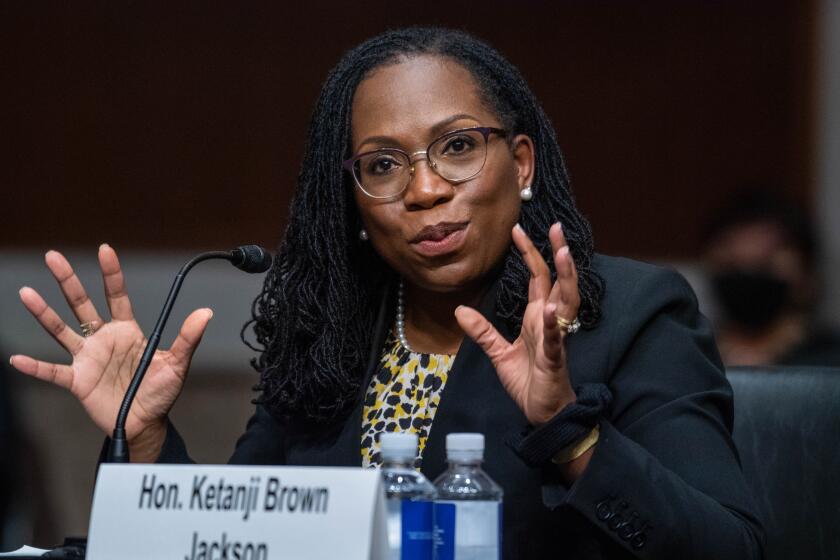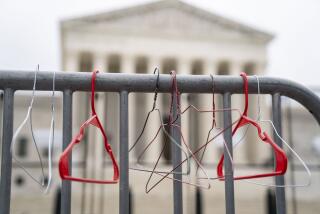Column: The consequential — and inconsequential — nomination of Ketanji Brown Jackson

Over the course of 29 days since Justice Stephen G. Breyer announced his retirement from the Supreme Court, Judge Ketanji Brown Jackson assumed the front-runner’s position to replace him. On Friday morning President Biden named her his nominee, and if confirmed she will become the first Black woman on the court.
Jackson, 51, is not the head-and-shoulders most credentialed of the three leading candidates that were under consideration — Leondra Kruger, a California Supreme Court justice, has an equally impressive resume, and at age 45, she would have the longest potential term on the court. Nor does Jackson have the political muscle of the other stellar candidate, U.S. District Court Judge J. Michelle Childs, 55, who had support from Rep. James E. Clyburn (D-S.C.) and Sen. Lindsey Graham (R-S.C.).
But she has the strongest claim to confirmability on terms the Biden administration can claim as bipartisan. She was confirmed in June to the U.S. Court of Appeals for the D.C. Circuit, the second-most important court in the country, with the support of three Republican senators. It would be a feat of almost impossible political gymnastics for those three — Graham, Lisa Murkowski (R-Alaska) and Susan Collins (R-Maine) — to turn against her so soon. On Friday, the former Republican House Speaker, Paul Ryan tweeted, “Our politics may differ, but my praise for Ketanji’s intellect, for her character, and for her integrity, is unequivocal.”
If confirmed, Judge Ketanji Brown Jackson would be the first Black woman to serve as a justice on the high court.
The monthlong nomination process, rapid by recent practice, can fairly be summarized as a search for some reason in the records or personalities of the other candidates to justify a marginally greater chance at bipartisan confirmability than Jackson presents, and a failure to find one.
That is not to say that the case for Jackson consists of confirmability alone. She checks a lot of boxes for Biden and the court.
Jackson‘s nomination fulfills the pledge Biden made, with his back against the wall at a South Carolina debate, to nominate a Black woman to the court. Publicly limiting his choices on the basis of race and gender has drawn criticism from Republicans, but no less an avatar of Republicanism than Ronald Reagan campaigned on a similar pledge, vowing to nominate the first woman on the court and later appointing Sandra Day O’Connor.
Moreover, on the merits of the criterion, there is broad acceptance of the idea that the court ideally should resemble the country, and in any case, voters chose Biden knowing he had made the pledge, a sufficient endorsement in itself.
Jackson is an unequivocally well-qualified nominee. She has the same sort of platinum-plated resume as the other justices: Harvard College and Harvard Law School, hot shot law firms and three prestigious clerkships, culminating with service for Breyer, who has described her as “great, brilliant, decent.”
Jackson also brings valuable professional diversity to the court. She served for two years as an assistant federal public defender. The last justice with remotely comparable experience was Thurgood Marshall, for whom I clerked. He brought a certain authority to the court’s criminal docket from having represented the accused. Jackson would do the same.
U.S. Appeals Court Judge Ketanji Jackson, the front-runner for the nomination, graduated with high honors from Harvard and clerked for Justice Breyer.
Jackson also served, with unanimous Senate consent, on the United States Sentencing Commission, the independent agency that drafts and analyzes federal sentencing guidelines. Federal sentencing law is a big part of the Supreme Court’s docket, and with the departure of Breyer, who helped write the current guidelines, her expertise will enhance the court’s decision-making.
Finally, for eight years Jackson was a judge at the federal trial court level, so she understands how cases begin and can sniff out the facts of a case from the cold appellate record. On the current court, only Justice Sonia Sotomayor served on the trial bench.
Her extensive qualifications notwithstanding, we should not expect her confirmation process to be all sweetness and light. Forty-four Republicans voted against her for the D.C. Circuit, and many of them will use their “advice and consent” power, and their turn under the lights (and a valuable fundraising opportunity), to inveigh against the president and accuse the nominee of wild-eyed activism and legislating from the bench.
They won’t have a lot to work with, but Jackson’s record as a district court judge does include some noteworthy reversals, including a ruling against the Trump administration and in favor of federal employee unions. Probably her highest profile ruling required former White House counsel Don McGahn to testify before the House Judiciary Committee. It included the much quoted sentence: “Stated simply, the primary takeaway from the past 250 years of recorded American history is that presidents are not kings.” (McGahn eventually testified by agreement with the committee.)
One other major fact defines this nomination: It is the least consequential in the last 50 years. The court’s conservative hammerlock will not change. For that reason, we can expect a bit of hot rhetoric from GOP senators during the confirmation hearings, but the Republicans have no reason to wage a bloody battle against Jackson that they would be virtually certain to lose. Having blasted through norms and the Constitution’s rules to achieve a lopsided conservative court majority, Mitch McConnell and Co. can choose to hang back and pretend to be statesmen.
Whatever bruising attacks may come her way, Jackson — who, in addition to her excellent paper credentials, has by all accounts a winning personality — should prevail. All she needs is the equanimity she has already proved she possesses and to stay on her game, which should be very well-practiced by the time she takes the chair before the Judiciary Committee and is formally introduced to the American people. Only a self-inflicted wound can threaten her barrier-breaking ascent to the court.
More to Read
A cure for the common opinion
Get thought-provoking perspectives with our weekly newsletter.
You may occasionally receive promotional content from the Los Angeles Times.













